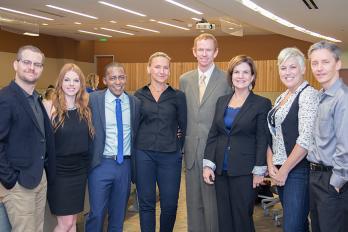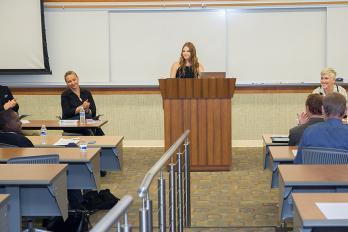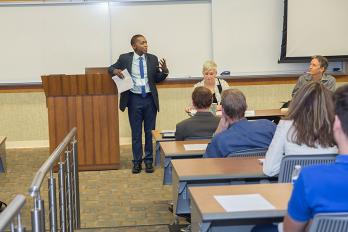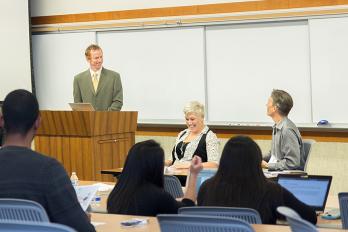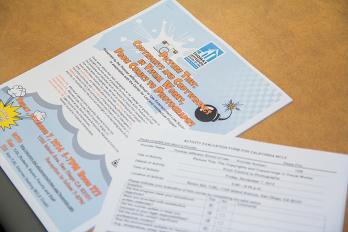TJSL Contributes to Copyright Discourse
November 21, 2014
On Friday, November 7, 2014, “Picture This: Copyrights and Copywrongs in Visual Works From Comics to Photographs,” brought copyright experts from around San Diego to TJSL. The two-hour long conference, produced and hosted by Professor K.J. Greene in collaboration with TJSL’s Entertainment Law Society and the Center for Law and Intellectual Property, was followed by a reception for panelists and guests.
Moderated by Professor Jeff Slattery, the conference provided insight into the types of issues that arise in copyright law when dealing with artists and a variety of visual works.
Panelist David Lizerbram led the discussion by explaining how the fair use doctrine can be used as a defense to copyright infringement suits and the broadening of the defense by transformative use. Despite an open circuit split regarding what constitutes transformative use, Lizerbram noted, “The state of law seems to be that if a court finds a work to be transformative, it will qualify for fair use protection.”
Marketing manager and producer for an interactive design firm, and entrepreneur turned attorney, Leslie Burns spoke about the pitfalls of stepping into the copyright process after a client has begun the process without the proper knowledge. “Taking the time to educate our clients should be our highest ethical concern,” said Burns. For Burns, combining her creative background with her legal career has brought her a great deal of personal satisfaction.
Alumna Lacy J Lodes ‘08, current in-house counsel for Cryptozoic Entertainment, discussed the importance of risk analysis in copyright and the challenge orphaned works can create when trying to put together licensing agreements. “In business you have to take a lot of risks, but copyright is one to be wary about,” Lodes said.
The final panelist of the evening is best described as a lawyer for cartoonists and a cartoonist for lawyers. Stu Rees sparked a discussion about modern trends in copyright. Rees touched upon the public’s tendency to want to use copyrighted items for free, the drawbacks of transformative use, and the copyright office’s policy of engaging in substantive review of applications. For Rees, “Copyright is a raging disaster from registration to litigation.”
The question and answer session that followed revisited the panels’ discussions but also provided an opportunity to broaden the dialogue. Panelist Leslie Burns was impressed by the level of student engagement at the event. “There were good questions during the event itself and after, at the reception, I had several one-on-one conversations with very bright, interested, and thoughtful students,” said Burns. “I was also happy to see that non-students attended and were taking notes as well. We could have gone on for hours and I think the audience could have too.”
“This was a well-attended and flawless event with a truly invigorating and erudite panel of some of SD’s best IP lawyers. It just shows the passion of our faculty and students for IP. And Professor Slattery is a superb moderator.” said Professor Greene. “We produce high-content, cutting edge IP conferences to showcase TJSL’s strengths, including an outstanding faculty, engaged and talented students like my director ELS President Michelle Ribaudo and the Entertainment Law Society team, and to boost our reputation in the community.”
